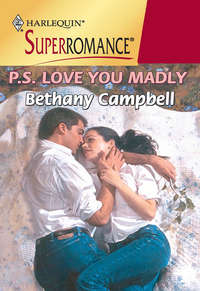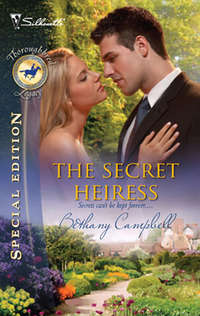
Полная версия
One True Secret
Her lip curled in disdain, and she made a sound deep in her throat like a small, warning growl. Turning from him, she stalked toward the path that led back to the house. He stayed by her side, and he didn’t let up. “You drive to Marathon at least once a month. You go grocery shopping there. Why? Why drive forty miles to Marathon instead of fifteen to Key West? Because the Winn-Dixie store there has a pharmacy? I think so. But the pharmacists there are a tight-lipped bunch. Not like a certain person at Killian’s. It’s amazing the information you can buy for a hundred bucks.”
She stopped in her tracks again, and this time he thought she was going to take a swing at him. “You’re a disgusting excuse for a human being. Low, rancid and disgusting.”
“And you’re beautiful when you’re angry.” He smirked.
“A cliché. Sorry, but it’s true.”
“You had somebody follow me to Marathon?”
“No. The detective had somebody follow you.”
“Don’t play word games with me, you odious toad.”
“Then don’t lie. Why go to so much trouble to cover up what drugs your grandfather takes?”
“Go to hell,” she said. “This interview’s over. And don’t come back tomorrow. I’m not talking to a low-down sneak.”
“Ah,” he said with satisfaction. “But we have an agreement. You signed it with Mondragon.”
“Take your agreement,” she snapped at him, “fold it five ways and shove it where the sun won’t shine.”
She stamped toward her sandals, snatched them up and jammed them onto her feet. And she was off, walking up the path so fast she almost loped.
He didn’t have time to put on his own sandals; he went right after her. This was a mistake. The path was rough, and littered with burrs that cut his feet.
But he kept up with her anyway. “You have a contract, and you have to honor it,” he said, all teasing gone from his voice. “Besides that, you need to talk to me.”
“When we get to the house, you get in your car and get off our property. Or I’ll throw rocks at you. I swear it.”
He had no doubt she meant it. “You need to talk to me, because you need to know what else I know. If I can find these things out, so can other people. And I know some interesting things. You can discuss them frankly. Or I can publish them and say you refuse to explain. That would be damaging to you. And to your grandfather. To your whole family.”
She speared him with another of her killer glares. “I said don’t come back. I meant it.”
She lifted her skirt to avoid a short, burr-laden bush. He couldn’t stop himself. He grasped her by one forearm and forced her to halt.
She jerked as if he’d seared her with live wires. This time she was going to hit him. In a flash, she raised her open hand and drew it back to slap his face.
He caught her wrist. “Stop,” he warned, getting angry himself. “And listen. I’ll be back, and you’ll talk to me, and you’ll talk straight.”
She narrowed her eyes in pure malevolence. “And if I won’t talk?”
He brought his face close to hers. “In that case, I’m going to have to implicate you and your family in a million-dollar scam. So you need to talk to me if you want to prove that you aren’t in the middle of the biggest fraud in the art world.”
MERRIMAN FASCINATED Claire. He’d put Bunbury down so he could take notes on the flowers and shoot more pictures, but he’d patted and rubbed and caressed the cat so thoroughly that Bunbury was clearly in love.
He stayed next to Merriman, rubbing against the man’s leg and purring. Claire hadn’t thought the cat would take to strangers, for he hardly ever saw any.
But she saw few herself, and she, too, took to Merriman. He seemed shy and friendly at once, a mysterious combination. And he acted so interested in everything she said that she found it easy, even pleasant, to answer his questions.
“It’s a coral vine,” she told him as he knelt to shoot a vine covered with dark-pink blossoms. “The flowers look like a string of hearts. Some people call it the Chain of Love.”
He snapped three shots, then wrote the name in his notebook. He looked up and gave her a bashful smile. “Chain of Love. That’s a pretty name.”
His smile was intriguing. It was straight, not curved like the grin of the Cheshire cat. And when he smiled, for some reason, his forehead wrinkled, so that his smile looked…thoughtful.
He had thick dark-blond hair that wouldn’t stay put; it stirred constantly in the breeze. He was handsome in a way that was both boyish and rugged.
He pointed at a white-flowered vine, strung with similarly shaped blooms. “Is this another kind of Chain of Love?”
He looked so earnest that she almost smiled herself. “That’s a bleeding heart. In some places they use the flower to cast spells.”
The wind rippled his hair so it fell over his forehead. “What kind of spells?”
Maybe she shouldn’t have brought that up; a blush heated her face. “Spells to…attract something…that you, uh, desire.”
“Could I take a sprig?”
She tilted her head in puzzlement. “What for?”
“A souvenir. Something real. Not just pictures.”
She licked her lips nervously. He watched the movement as if it hypnotized him. “I guess,” she breathed.
“I’ll take the pictures first.” He moved nearer the vine, Bunbury pressing against his knee. He clicked the shutter three times and jotted a note in his tablet. Carefully, he picked a section of vine hung with delicate flowers. He tucked it in the buttonhole of his blue shirt.
Then he gave her such a long look that she felt more embarrassed than before. He said, “I don’t suppose you’d let me take your photo.”
“Oh, no,” she said, alarmed. “I couldn’t do that. We don’t want our pictures in any magazine.”
“Not for the magazine. For me. To remember you. Nobody else would see it. I promise.”
She shook her head. “No. I couldn’t do that.”
“I’d really like to,” he said. “On my word of honor, it wouldn’t be for publication.”
“No,” she repeated. “I can’t. I don’t even know why you’re taking pictures of the flowers. They could be anybody’s flowers.”
“They’re your flowers,” he said.
“Not really. I just help take care of them. They belong to my grandparents.”
“Maybe they inspire your grandfather’s paintings. His paintings are colorful. Strong colors.”
She turned and stared at the banyan tree. “I can’t talk about him. Or the paintings.”
“You don’t have to,” he said. He put his tablet aside and rubbed Bunbury’s back. His expression went solemn, as if he was thinking hard. “Will I see you tomorrow?”
Confusion filled her. “No. Probably not.” But she had wanted to say yes. She had wanted to say it very much.
“The next day?” he persisted.
“No. I shouldn’t be here now. I should go back inside.”
She got to her feet and went to pick up Bunbury, but the cat was pressed so affectionately against Merriman’s thigh that her hand brushed the man’s leg.
She’d knelt so that her eyes were now on the same level as Merriman’s. “Would you go out with me?” he asked.
She froze, her hands on the cat’s bulging middle. The question was extraordinary. “What?”
“Would you go out with me?” he repeated. “I wouldn’t pry into your family’s business, I swear. I’d just like to be with you. I know it—”
The gate clanged as Emerson burst through it. She stopped and stared in anger at Claire and Merriman kneeling so closely together. Beyond her, standing outside the gate, Claire could see Eli Garner, his expression fierce.
“What’s this?” Emerson demanded. “Claire, you were supposed to stay inside.”
Claire, usually mild-mannered, was offended by her sister’s tone. “I came out to get Bunbury.”
“Have you been talking to this person?” Emerson glared at Merriman.
“I told him the names of some plants,” Claire said.
“You—” Emerson pointed at Merriman. “Your hour here’s up. Leave now.”
“Emerson,” Claire objected, “there’s no need to be rude. He hasn’t done anything.”
Emerson ignored her. She shook her finger at the photographer. “I said time’s up. Leave. You and your sleazy friend.”
“Emerson!” Claire was shocked. She’d never seen her sister so imperious.
Merriman stood, picking up his tablet. “I’ll leave,” he said calmly. “And your sister’s right. I asked her about the banyan and the flowers. That’s all we talked about.”
Claire, too, rose, clutching Bunbury. Merriman turned to her. “Goodbye. And thank you. I hope I’ll see you again.”
“I—I hope so, too,” Claire stammered, amazing herself.
Then Merriman was leaving, and Claire felt a sense of something almost like bereavement. He nodded to Emerson. “Good day, Miss Roth. I’m sorry to have upset you.”
As soon as he was out of the gate, Emerson slammed it behind him.
“Em! Why were you so hateful?” Claire protested.
“He’s a nice man. He really is.”
“Nice?” Emerson fumed. “Those men are treacherous. They want to ruin us.”
Claire shook her head stubbornly. “I can’t believe that about him. I won’t.”
“You will when you know the truth. Come inside. Nana’s got to hear this. We need to have a council of war.”
“War?” Claire echoed, horrified.
“Yes.” Emerson said it with ferocious conviction. “War.”
“GOOD GOD,” Merriman complained, “what did you do to that woman? What did you say to her?”
As the car passed through the gates to the estate, rain began to fall in fat, cold drops. Eli glowered at the sky as if even the heavens had decided to punish him. “I told her the truth.”
“What truth?” Merriman asked, pushing his hair out of his eyes. “Hey, put the top up, will you?”
“I told her that Mondragon had a detective investigating them. And he found out some strange things.”
He punched the button that brought the convertible’s top up. He punched it savagely because it suited his mood. The top rose with a smooth whir.
Merriman stared at him with an expression of disgust. “A detective? You never told me that. I’m surprised she didn’t knock your block off.”
“She tried,” Eli said from between his teeth. He still remembered how swiftly she’d drawn her hand back to slap him. And his feet hurt from walking on burrs. He was still barefoot, his feet scratched and bleeding.
“I don’t blame her,” Merriman said. “Why’d you tell her? It was sure to rile her.”
“I had to tell her so she’d stop trying to stonewall me,” Eli said. The car clattered over the rusted metal bridge.
“She doesn’t like it, but I’ve got her where I want her, and she knows it. That’s why she’s mad.”
“Great. I was just starting to get somewhere with the sister, and you make me seem like a…spy or something.” Merriman swore and stared glumly out at the rain.
Eli frowned at him. “Get somewhere with her? You mean you were actually getting information out of her?”
Merriman shot him a dirty look. “I don’t want information. I like her. I’ve never met anybody like her. And now you’ve queered it. She’ll think I’m a weasel.”
Eli grimaced in disbelief. “You like her? You’re supposed to be a professional. We’re here on a story. She’s part of it. If she talked to you, what in hell did she say?”
“We talked about flowers. I patted her cat. She seemed to trust me, but now—”
“You petted her cat? You talked about flowers? Does the word journalism have no meaning for you?”
“I’m just the guy who takes pictures. You’re the investigator.”
“Before you saw the broad, you were singing a different song,” Eli accused.
“She’s not a broad,” Merriman retorted. “She’s a lady. Now I’ll probably never see her again—thanks to you.”
“My heart bleeds.”
Merriman narrowed his eyes. “You know, for a guy who has Emerson Roth exactly where he wants, you’re in a rotten mood. You know what I think? I think you’ve got the hots for her. And you blew your chance with her—big time. Smooth, Garner.”
Merriman’s words annoyed Eli because they were true. Emerson Roth was a beautiful woman. But more than that, she had spirit, she was smart…and loyal to a fault. He didn’t want her to be guilty of high crimes and misdemeanors, but he feared she was.
He wanted her to have a reasonable, moral excuse for the games her family played. He didn’t want her to hate him. But it was too late for that. The damage was done.
Eli was relentless; it went with his job. He could go beyond relentless to ruthless when he had to, and he had been ruthless with Emerson.
She would talk to him again tomorrow because she had no choice.
And he would show her no mercy. Because he couldn’t.
THE THREE WOMEN sat in the living room. It was a large, airy room, and most days light flooded through the big windows.
But the sun was hidden in the gloom of fast-moving clouds, and rain beat against the glass. Emerson sat alone on the white couch, and Claire sat in the rattan rocker, looking atypically rebellious. Nana got up from the armchair and switched on the Tiffany lamp.
She turned to face the two young women. “So, Em, what did this detective tell the Garner man?”
“I don’t know,” Emerson admitted unhappily. “That’s why I have to talk to him again. To see how much he knows.”
Nana moved to the Queen Anne chair and sat down, looking small but regal. She twined her gnarled fingers together. “They looked at our credit card records?”
“Yes,” Emerson said bitterly. She’d warned them to be careful with credit cards. Emerson herself was careful even with checks. She paid cash whenever possible.
She cast an accusing glance at Claire. “Why did you charge our prescriptions so often? Why didn’t you think?”
Claire, clutching the arms of the rocker, kept her air of defiance. “I thought we only had to be careful about the Captain.”
“I worried for years that we’d slip up,” Emerson snapped. “I told you we couldn’t be too careful.”
Claire’s defenses wobbled. “Em, I made a mistake. I’m sorry. But my mind doesn’t work like yours. For me, it’s exhausting, watching every move I make. It’s confusing. It’s nerve-racking. It’s paralyzing.”
Nana shook her finger gently at Emerson. “She made an innocent faux pas, Em. Do not scold. It does no good to squabble.”
Emerson felt a surge of guilt for rebuking Claire. She knew that the family secrets preyed on Claire, that they gnawed at her nerves and undermined her confidence.
Claire was retiring, like Nana. Emerson took after the Captain. The Captain had been so bold it was breathtaking. But now he could no longer be bold, and his job fell to her. She was daring, she was quick-witted, and, like the Captain, she could play a part and play it well.
Yet Eli Garner was a formidable opponent. It was possible he was too formidable. Had she met her match? The thought terrified her. Not so much for her own sake, but for her family’s. Their future and their welfare depended on her. She was their protector, and she loved them passionately.
She let her gaze meander over the room’s walls. The paintings hung there, and she loved them, too. They were striking and so full of life they seemed to glow with it. It was her duty to protect them, too, all that vivid, glorious work signed Roth.
She turned to face Claire. “I’m sorry, too. It’s just…upsetting. To have people prying. Spying on you.”
Claire winced and nodded. Nana said, “Em, someone followed you to Marathon, when you went to get the Captain’s medicine. Do you suppose he even followed you to the pharmacy counter?”
“Yes. He must have.”
The thought of being stalked and watched gave Emerson a sick feeling in the pit of her stomach. What else had the informer seen?
Nana squeezed her fingers together more tightly. “They may have watched the beach from out in the cove. They may have seen the Captain from there. They may have even photographed him.”
Emerson swallowed. “I know. A good telephoto lens— I wonder how much they could see, what they could tell about him?”
“Let’s hope very little,” Nana said. “We’ve always been discreet.”
But not discreet enough, Emerson thought bleakly. What else did Eli Garner know?
Claire said in a small voice, “What can we do?”
Emerson smoothed her hair, which was still tousled from the wind. At the front of the house, she heard a scraping sound, and then a rattling and banging. Now that the outsiders were gone, Frenchy must be fastening the hurricane shutters in place.
“The first thing,” Emerson said, forcing her voice to sound calm, “is to talk to the Captain. I’ll go to him.”
Nana shook her head firmly. “No. I will. It’s best if I do.” She started for the door. But she paused for a moment and stared at the paintings on the walls. Emerson thought she saw tears glint in the older woman’s eyes, and a knot rose in her own throat.
Slowly, looking tired, Nana left the living room.
When Claire was certain Nana was out of hearing, she looked warily at Emerson. “I suppose you’re going to tell me not to talk to the photographer again.”
Emerson remembered the sight of the two of them crouched by the cat, staring raptly into each other’s eyes. The photographer had initially struck Emerson as harmless. He’d seemed truly smitten by Claire, and she by him.
Merriman might be as bad a scoundrel as Eli. Or he might not. But it seemed wrong to give Claire orders as if she were a child or an incompetent.
“Suit yourself,” she told Claire. “But be careful. Do you want to see him again?”
Claire didn’t answer immediately. She sat looking up at the painting over the mantel. Then, softly, she said, “Em, don’t you get tired of it? Of living this way? Sometimes don’t you think it would be better if we could just…tell the truth?”
Emerson wanted to say yes. It would be much better for Claire, who was not a creature formed for deception. It would be better for her, too, because maintaining the illusion took all her effort and energy. It ruled her life.
But she and Claire were not the only people caught in this complex web. There was Nana, there was the Captain…and there was more, much more at stake.
“We’ll tell the truth someday,” she said, rising and going to the window. “But not yet.”
“But how can you throw this Garner man off the track?” Claire asked.
“I’ll find a way.” Emerson said it with a confidence that seemed perfect. But it was false. Secretly she was more frightened by Eli Garner than by anyone or anything she had ever encountered.
CHAPTER FOUR
ELI DROPPED Merriman off at the hotel, grabbed his swim gear, then drove back north. He spent the afternoon at the best stretch of public beach in the Keys, Bahia Hondo.
The wind was high, the rain intermittent. The beach was deserted, which suited him fine.
His scratched feet hurt. The sand irritated them, and the salt water stung them. He didn’t care. The pain distracted him. He didn’t want to think about Emerson Roth, or her sweet-faced sister. He thought of them anyway.
Neither did he want to think about his own life, but he couldn’t stop himself. For years he’d gone from place to place, trying to solve puzzles. Some of the puzzles were unsolvable. Others were foolish, mere hoaxes or pranks to be exposed.
On occasion Eli’s work was dangerous. He had a scar on his chest from a bullet and one on his back from a machete. He’d been shadowed in Kuwait, beaten in New Delhi and drugged in Paris. He was still recovering from the caper in Yucatán, and he was not recovering swiftly. The machete wound still ached, and sometimes his fever came back.
The life of an investigative reporter was much like that of a soldier. It could be ninety-eight percent boredom and two percent terror. Sometimes he was tired of both.
His work could be disturbing as well as dangerous. If he had been hurt from time to time, he’d hurt others in return. He’d stripped them of their honor and watched the law strip them of their wealth, and sometimes their very freedom. Some of the people involved were criminals, and he didn’t mind what happened to them. But others were misled or deluded or desperate, and some were simply innocent bystanders.
There was a puzzle about the Roths, and it was a troubling one. But what was its nature and how culpable was Emerson Roth?
Sick of brooding, he waded into the churning waves. The sea was too rough to swim in comfort. He did anyway, the salt stinging the soles of his feet. Then he sat alone on the beach, throwing pebbles at the choppy waves and letting the rain pelt him.
When the rain began to pour down in earnest, he put on his street clothes in the little changing room, then limped back to his car. He hadn’t eaten, so he stopped at a rustic restaurant on Cudjo Key.
Few customers were inside, and none out at the garden tables, where the tropical trees waved their branches in the wind and flowers were beaten down by the assault of the rain.
Outside, workers fastened hurricane shutters, cutting off the view of the garden. The waitress was blond, busty, middle-aged, tanned to a crisp and friendly. She called him “hon” and said her name was Brenda.
“You here on vacation?” she asked, setting a plate of red snapper before him.
“No. I deal in art,” he said. It wasn’t exactly a lie. He switched the topic to her. “You lived here long?”
“All my life,” she laughed. “Born and bred here. Where’re you from?”
“I’m based in New York, but I travel a lot,” Eli said.
She raised a heavily penciled eyebrow. “Art dealer, huh? Lotta galleries in Key West.”
“Yup.” That was no lie, either.
Brenda looked philosophical. “Well, hope you got your work done and are headin’ home. We’re gonna have a big blow, I’m afraid.”
“It feels worse,” he said. He hadn’t bothered to turn on the car radio.
“Looks like its headin’ for Cuba. Folks’ll be evacuatin’.” Brenda nodded in the direction of the highway.
“That road out there’s gonna be mighty crowded. Ugh. Head north now, and you can get a head start.”
He shook his head. “Can’t. I got an appointment tomorrow I can’t cancel. Took too much work to get it. Local artist.”
She looked curious, so he thought he’d push further. “Nathan Roth.”
Her expression went dubious. So did her tone. “You’re talking to Nathan Roth?”
“His family, not him.” Eli did a good imitation of looking sincere and troubled. “Something may be up with him. Nobody’s seen him around for a long time.”
“You’re tellin’ me,” Brenda said. “He used to be in here every weekend. This was one of his favorite places. Liked the live music. Good-natured guy. Come here with that little wife of his. She hung back, but he’d get a few beers in him, be life of the party. Then…poof.”
“Poof?”
“He stopped coming. Just like that. Poof. Like he’d vanished.”
“Why?”
She gave an elaborate shrug. “I don’t know. There are rumors.”
He frowned and made his expression more concerned. “Can you say what? The outfit I represent is worried. They’ve heard rumors, too.”
Conflict played across her face. “I don’t know,” she said at last. “People think maybe it’s his health.”
“His hearing? One thing we’ve heard is that he lost his hearing.”
“No,” she said immediately. “More serious than that.”
He looked at her as if he’d just discovered his guardian angel. He’d given this look to women many time before, and it usually worked.
He said, “That’s what we’re afraid of. You’re the first person I’ve met here who’s actually known him. What do you think happened to him?”
She tapped her forehead. “His mind going? Something like that, maybe? He was kind of forgetful the last few times I saw him. And…sometimes he was different. Once he argued that I didn’t add up his check right. But I had. He got it all wrong.”
Eli felt his chest contract, and a chill played under his skin. The woman hadn’t said it outright, but she’d hinted clearly. This was the gossip growing and spreading through the art world about Nathan Roth: something had happened to his lively and creative mind.







